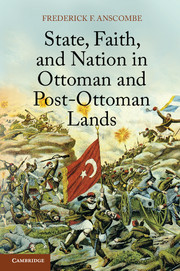Book contents
- Frontmatter
- Dedication
- Contents
- List of Maps and Images
- Acknowledgments
- Transliteration and Abbreviations
- Maps
- Introduction
- Part I The Ottoman Empire
- 1 State, Faith, Nation, and the Ottoman Empire
- 2 The Premodern Islamic State and Military Modernization
- 3 The Breaking of the Premodern Islamic State
- 4 The Reconstructed Muslim State
- 5 End of Empire
- Part II From Ottoman to Post-Ottoman States
- Part III Contemporary Post-Ottoman States
- Conclusion State, Faith, and Nation
- Bibliography
- Index
- References
5 - End of Empire
Published online by Cambridge University Press: 05 June 2014
- Frontmatter
- Dedication
- Contents
- List of Maps and Images
- Acknowledgments
- Transliteration and Abbreviations
- Maps
- Introduction
- Part I The Ottoman Empire
- 1 State, Faith, Nation, and the Ottoman Empire
- 2 The Premodern Islamic State and Military Modernization
- 3 The Breaking of the Premodern Islamic State
- 4 The Reconstructed Muslim State
- 5 End of Empire
- Part II From Ottoman to Post-Ottoman States
- Part III Contemporary Post-Ottoman States
- Conclusion State, Faith, and Nation
- Bibliography
- Index
- References
Summary
Eagerness to apply the strength that the Ottoman state had gained since 1839 led to the empire’s collapse a decade after the Committee of Union and Progress (CUP) came to power. This sorrowful end was caused in large part by growing pressure from foreign powers, of course, but the dominant clique in the CUP weakened the state’s and population’s ability to withstand such forces. The regime damaged state-society relations by undercutting the legal safeguards against autocratic rule that had been instituted since 1839, and the harsher, more violent administration that resulted troubled parts of the population even before the disasters of the First World War. The CUP thus hastened precisely what it had intended to prevent: the loss of land, people, and ultimately independence.
Mutinous military officers’ opposition to Abdülhamid’s rule originated in frustration over his pusillanimous submission to what many Muslims regarded as Europe’s bullying, but others in state service who welcomed restoration of the constitution had grown weary primarily of his autocratic tendencies. Still others, particularly in the general Muslim population, had had no desire for fundamental change in the extant system, which had appeared to function reasonably well outside Macedonia. Abdülhamid actually gained in popularity following his decision to restore the constitution, indicating the weakness of popular alienation from him personally as dynastic leader. It thus did not take long for serious divisions to emerge between groups wishing for progressively more liberal rule, a return to sultanic-caliphal primacy, or more assertively centralizing authoritarianism. The clique of the CUP that was to establish dominance over imperial affairs by 1913 and was therefore placed to decide any lingering dispute over future direction was rooted in the military, a background that encouraged them to favor centralization and authoritarianism. The important figures in the clique who were not graduates of the military staff college had studied medicine or been trained as bureaucrats, and their education may have inclined them to favor the pseudoscience of positivism as much as the army officers did. Another source of common perspective was familial background in the Balkans and northwestern Anatolia, the regions recognized as the most vulnerable to Christian threats.
- Type
- Chapter
- Information
- State, Faith, and Nation in Ottoman and Post-Ottoman Lands , pp. 121 - 140Publisher: Cambridge University PressPrint publication year: 2014

